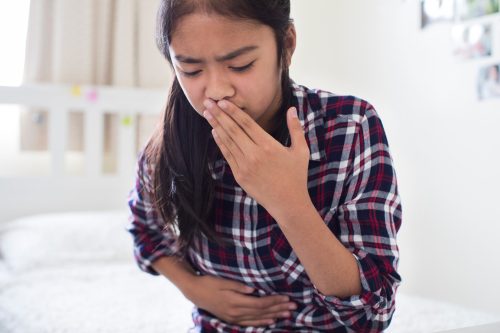Abdominal Pain in Children - What to Do

Abdominal pain in children can be a source of great concern for parents and is a common complaint in paediatric care. It may occur suddenly, leaving both the child and the caregivers anxious and puzzled. Children often call abdominal pain a “tummy ache” or a “stomachache” and may also have difficulty expressing their discomfort accurately. The severity and frequency of this problem varies and can stem from various causes.
Causes of Abdominal Pain in Children
Abdominal pain in children can have a wide range of causes. Understanding these causes is crucial for effective management. Common causes include:
- Gastrointestinal Issues: Problems like indigestion, gas, or food allergies can lead to abdominal discomfort in children.
- Infections: Viral or bacterial infections, such as stomach flu or gastroenteritis, can result in abdominal pain and discomfort.
- Appendicitis: Pain in the lower right side of the abdomen can be a sign of appendicitis, and it is a condition requiring immediate medical attention.
- Constipation: This is common in children, often causing lower stomach pain or discomfort.
- Irritable Bowel Syndrome: A common gastrointestinal disorder that causes recurrent abdominal pain in children, often accompanied by changes in bowel habits.
- Emotional Stress: Sometimes, stress or anxiety can manifest as stomach pain in children.
- Food Intolerances: Lactose intolerance and other food intolerances may lead to stomach pain in kids.
Risk Factors for Abdominal Pain in Children
Several risk factors can increase the likelihood of a child experiencing abdominal pain. These include:
- Age: Infants and toddlers may suffer from colic or gas-related abdominal pain. Older children and adolescents may experience stomach pain because of factors such as stress, diet, or infections.
- Dietary Habits: A diet high in fatty or spicy foods can contribute to abdominal discomfort. Food allergies and intolerances can also be a factor.
- Infections: Exposure to viruses and bacteria, particularly in school or daycare settings, can increase the risk of abdominal pain.
- Family History: In a case where there is a family history of gastrointestinal conditions, children may be more susceptible to abdominal pain.

Signs and Symptoms of Abdominal Pain in Children
Recognizing the signs and symptoms of abdominal pain in children is essential for early intervention. Common signs and symptoms include:
- Location of Pain: Ask your child to point to where the pain is. Different areas of the abdomen may indicate what the underlying issue is.
- Severity: Assess how severe the pain is. Mild discomfort may be manageable at home, while intense and persistent pain requires medical attention.
- Associated Symptoms: Look for symptoms such as vomiting, diarrhea, blood in stool, constipation, fever, rash, or changes in appetite and behavior.
Diagnosis of Abdominal Pain in Children
Diagnosing the cause of abdominal pain in children can be a complex process. It often involves a combination of medical history, physical examination, and, in some cases, diagnostic tests. Your paediatrician may:
- Take a Detailed Medical History: Discuss your child’s symptoms, dietary habits, and any relevant family medical history.
- Conduct a Physical Examination: Your paediatrician will perform a physical examination to assess your child’s vital signs, abdomen, and overall health.
- Order Diagnostic Tests: In some cases, further tests such as blood tests, stool analysis, or imaging studies like X-rays or ultrasound may be necessary.

Managing Abdominal Pain in Children
When your child complains of abdominal pain, your primary concern is their comfort and well-being. Here are some steps to consider:
- Consult a Paediatrician: If your child experiences frequent or severe stomach pain, it’s crucial to seek medical advice. At SBCC Baby and Child Clinic, a renowned paediatric clinic chain in Singapore, our team of experienced paediatricians is dedicated to providing the best care for your child.
- Medicine for Stomach Pain: Over-the-counter pain relievers or antacids may sometimes help. However, always consult a healthcare professional before administering a medication to your child.
- Dietary Adjustments: With food intolerances, implementing changes in a diet can help alleviate abdominal discomfort.
- Hydration: Encourage your child to drink plenty of fluids, especially if the pain is due to constipation.
- Rest and Comfort: Encourage your child to rest and take it easy. A calm and comfortable environment can help your child relax and recover. Consider providing a warm heating pad or water bottle to ease discomfort, but be cautious not to use excessive heat, which could cause burns.
- Regular Bathroom Habits: If constipation is the suspected cause of abdominal pain, it helps to ensure that your child maintains regular bathroom habits. Encourage them to visit the toilet at the same time every day and support a healthy diet rich in fibre. Fibre-rich foods like whole grains, fruits, and vegetables can aid in bowel regularity.
- Observation and Communication: Keep a close eye on your child’s condition and be alert to any changes in the symptoms or their overall health. Do encourage your child to communicate their feelings and symptoms. Frequent communication can help your paediatrician assess treatment effectiveness and make adjustments if necessary.
- Follow-Up with the Paediatrician: In cases of persistent or recurrent abdominal pain, it’s essential to follow up with your paediatrician. Continued evaluation and monitoring of your child’s condition can help ensure appropriate management of the underlying cause.
Remember, each child is unique, and the treatment and management of abdominal pain may vary based on the specific cause and the child’s personal needs. Always consult your paediatrician for personalised guidance tailored to your child’s health and well-being.
When to Worry About Abdominal Pain in Children
Not all cases of abdominal pain in children require immediate medical attention. However, it’s essential to be vigilant and seek help if:
- The pain is severe, persistent, or worsening.
- Your child is unable to eat, drink, or pass gas.
- There is blood in the stool, vomitus, or urine
- Vomitus is greenish in colour.
- Your child has a high fever or exhibits other concerning symptoms.
Conclusion
Abdominal pain in children, whether occurring only at night or any time of the day, can be a distressing experience for both children and parents. Being informed will empower you to make the best decisions for your child’s well-being. At SBCC Baby and Child Clinic, we are committed to providing professional paediatric care in Singapore, ensuring your child’s health and well-being. When you are in doubt, it’s always advisable to consult a healthcare professional and receive expert guidance. Your child’s health is our priority.









